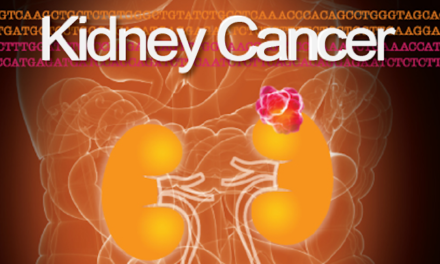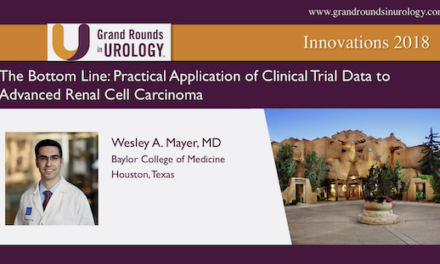Daniel P. Petrylak, MD, presented “Controversies in Renal Cell Carcinoma: Adjuvant TKIs and Clinical Trial Updates” during the 19th Annual Future Directions in Urology Symposium on August 11, 2018 in Colorado Springs, Colorado.
How to cite: Petrylak, Daniel P.. “Controversies in Renal Cell Carcinoma: Adjuvant TKIs and Clinical Trial Updates” August 11, 2018. Accessed [date today]. https://grandroundsinurology.com/controversies-in-renal-cell-carcinoma-adjuvant-tkis-and-clinical-trial-updates/
Controversies in Renal Cell Carcinoma: Adjuvant TKIs and Clinical Trial Updates – Summary:
Daniel P. Petrylak, MD, provides a brief update on the controversial use of tyrosine kinase inhibitors (TKIs) in renal cell carcinoma. He also reviews a study assessing sunitinib versus sunitinib plus nephrectomy in metastatic renal cell carcinoma.
Controversial Use of Adjuvant TKIs
Utilizing adjuvant TKIs in high-risk recurrent renal cell carcinoma patients post-nephrectomy causes toxicity issues. Currently, there are no trials to show that sunitinib, pazopanib, sorafenib have a survival benefit in this particular setting. Because of this, it is imperative to improve methods to determine patient selection for these drugs. Although the FDA has approved sunitinib for this line of therapy, he advises physicians to have an informed discussion with patients before administering the drug. Additionally, physicians should counsel poor-risk and intermediate-risk patients receiving TKI therapy as to whether or not they should undergo nephrectomy.
Sunitinib Alone Versus Sunitinib Plus Nephrectomy
A recent phase III trial published in the New England Journal of Medicine randomized metastatic clear-cell renal cell carcinoma patients into a sunitinib alone arm and a sunitinib plus nephrectomy arm. Results showed an improvement in survival with sunitinib alone. However, Dr. Petrylak notes that it is unclear as to whether these results are applicable to all patients. Poor-risk and intermediate-risk patients showed the best outcomes with sunitinib alone. Physicians need more data in order to conclude whether or not sunitinib alone has a survival benefit for good-risk patients. In the future, further studies are necessary to assess immunotherapy following nephrectomy for patients with metastatic disease.
About Dr. Petrylak
Dr. Petrylak is the Professor of Urology and Medicine at the Smilow Cancer Hospital at Yale University. He has been a pioneer in the research and development of new drugs and treatments to fight kidney cancer. Because of this experience, he has particular expertise in TKIs for renal cell carcinoma.
About the Future Directions in Urology Symposium
The Future Directions in Urology Symposium (FDUS) is an annual collaborative meeting with a faculty consisting of the top researchers, physicians, and educators in the field of urology. During FDUS, experts provide updates on recent developments and debate innovative management approaches in genitourinary cancers and urologic conditions. Subsequently, the experts devise consensus statements in accordance with the discussions held in the meeting.
In this video, Dr. Petrylak discloses the thesis of the discussion he led during FDUS.
ABOUT THE AUTHOR
Daniel P. Petrylak, MD, leads the genitourinary cancers medical oncology team at Smilow Cancer Hospital as director of the genitourinary cancer research group, professor, and co-director of the Cancer Signaling Network program. Dr. Petrylak joined Yale from Herbert Irving Cancer Center at Columbia University Medical Center with New York-Presbyterian Hospital, where he served as Professor of Medicine (Medical Oncology) and Urology and began his appointment in September of 2012. After serving for more than 20 years as the advanced bladder chair for SWOG, Dr. Petrylak is now the Vice Chair of the Genitourinary Committee.




